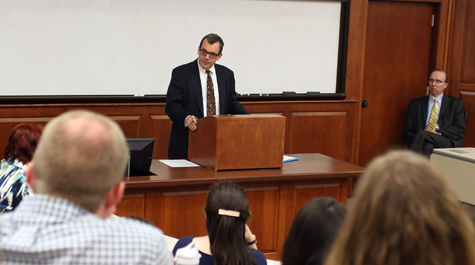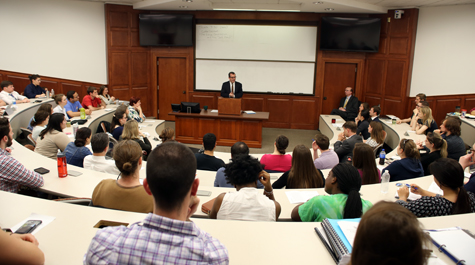Harvard Law’s John F. Manning Delivers Annual Cutler Lecture
On March 24, William & Mary hosted John F. Manning, the Deputy Dean and Bruce Bromley Professor of Law at Harvard Law School, who delivered the annual James Goold Cutler Lecture, “The Living Constitution and the Dead Hand.”
Dean Davison M. Douglas noted the event is William & Mary’s “most distinguished endowed lecture in constitutional law.” The lecture is named for an architect and inventor from New York who possessed a “keen interest in the law.”
Douglas welcomed Manning as an “extraordinarily respected scholar” who approaches major issues in constitutional authority with clarity in a substantial way.
Manning has been a faculty member at Harvard since 2004. Prior to Harvard, he served as the Michael I. Sovern Professor of Law at Columbia Law School, where he taught for 10 years. Manning currently teaches administrative law, federal courts, legislation and regulation, separation of powers, and statutory interpretation. His research explores statutory interpretation and structural constitutional law. Before turning to academia, his career includes serving as a former law clerk to the Hon. Antonin Scalia on the Supreme Court, and working as the Assistant to the Solicitor General of the U.S. Department of Justice.
Manning’s lecture explored whether the idea of a living constitution, where the text of the constitution is dynamic and mutable over time, in fact exacerbates the problem of the “dead hand,” the idea that the constitution allows the past generation to bind the present from beyond the grave.
Manning noted that the Constitution, a charter meant to guide an entire nation, “raised more questions than it answered,” even when it was first written in 1789. The “gaps and ambiguities” in the language of the constitution have produced “harder cases for 200 years, and it only is harder over time.”
Although the Constitution has changed very little since its creation—an intentional result of the difficult amendment process—the world around it has changed from an agricultural, coastal state to a deeply integrated nation. The question, Manning said, is how to interpret an eighteenth-century document not designed for issues it has to cover.
Manning’s lecture will be published in an upcoming issue of the William & Mary Law Review.
The Cutler Lecture series was established in 1927 by James Goold Cutler of Rochester, NY, to provide an annual lecture at William & Mary by “an outstanding authority on the Constitution of the United States.” The original series of 16 lectures were held from 1928 to 1944. After a period of dormancy, the Cutler lectures were revived in 1980-81 under the auspices of the Law School, with each lecture published in the William & Mary Law Review.
About William & Mary Law School
Thomas Jefferson founded William & Mary Law School in 1779 to train leaders for the new nation. Now in its third century, America's oldest law school continues its historic mission of educating citizen lawyers who are prepared both to lead and to serve.

